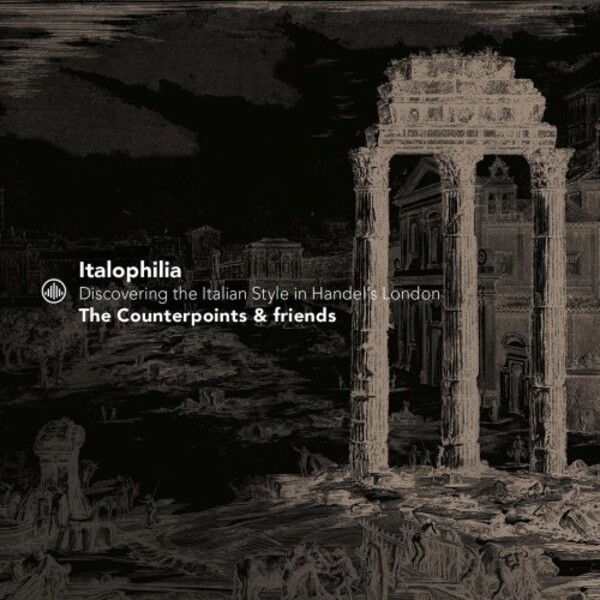Italophilia: Discovering the Italian Style in Handel’s London
View record and artist detailsRecord and Artist Details
Genre:
Chamber
Label: Challenge Classics
Magazine Review Date: 02/2025
Media Format: CD or Download
Media Runtime: 71
Mastering:
DDD
Catalogue Number: CC720003

Tracks:
| Composition | Artist Credit |
|---|---|
| (4) Grounds, Movement: D minor, Z D222 (Celebrate this festival, Z321) |
Henry Purcell, Composer
The Counterpoints |
| (10) Sonatas in Four Parts, Movement: D |
Henry Purcell, Composer
The Counterpoints |
| Augellin vago e canoro |
(Pietro) Alessandro (Gaspare) Scarlatti, Composer
The Counterpoints |
| (The) Mad Lover, Movement: Two Grounds |
John Eccles, Composer
The Counterpoints |
| Guitar Suite |
Nicola Matteis, Composer
The Counterpoints |
| Pensieri notturni di Filli, 'Nel dolce dell'oblio' |
George Frideric Handel, Composer
The Counterpoints |
| Tollets ground |
Anonymous, Composer
The Counterpoints |
| Trio Sonatas, Movement: No 1, HWV386 |
George Frideric Handel, Composer
The Counterpoints |
| (6) Sonatas for Cello and Continuo, Movement: D minor |
Francesco (Xaverio) Geminiani, Composer
The Counterpoints |
| Chamber Concerto |
Antonio Vivaldi, Composer
The Counterpoints |
| Farfalletta festosetta |
Maurice Greene, Composer
The Counterpoints |
Author: Mark Seow
The Counterpoints first came to my attention in June 2020 with their debut album, ‘La querelleuse’. I had been reviewing for Gramophone for just over a year. Yet I went in hard: ‘This debut disc is, hands down, some of the best recorded Telemann out there, and I am ready to go fist to fist with anyone who disagrees.’
I am delighted, and thoroughly relieved, that The Counterpoints have upheld this standard. Five years and a pandemic later, the ensemble have retained their sound of youthful optimism and benevolence. In fact, their rhetoric seems more unashamedly playful than ever. Head, for example, to Scarlatti’s cantata Augellin vago e canoro for smile-inducing ornamentation from recorder player Thomas Triesschijn and violinist Matthea de Muynck. In the second aria, the soprano Kristen Witmer is drawn into the fun; describing the caged bird, she seems to find increased freedom of expression. The bird in Scarlatti’s text is a common Baroque metaphor of unrequited love – ‘You never rest either wings or feet, always in perpetual motion’ – but potentially also referred to the trapped fate of the castrato (I, however, was reminded of the mythological martlet, the footless bird on Pembroke College’s crest, symbolising the perpetual quest for learning).
Like their debut album, ‘Italophilia’ moves deftly between solo and chamber music and cantata. And though the larger, formalised structures are excellently performed, the more folky, embroidered, improvisatory moments of the album stand out as exceptional. The Suite for guitar and basso continuo by Nicola Matteis from 1682, performed by plucker Giulio Quirici and cellist Petr Hamouz, is entirely lovely. Quirici subtly sketches counterpoint amid a canvas blued in appoggiaturas. In the anonymous ‘Tollets Ground’ (1706), Triesschijn releases a vibrantly hued torrent (no pun intended). I commented on the ‘ears-wide-open’ quality to Triesschijn’s playing on their previous album, and indeed here he demands a kind of plenisentient listening: the performance trades in sweetness, enjoyably hair-raising acidity, free-rolling exploration and chattering articulation. Against Quirici’s rhythmic play, it’s utterly enchanting.
Some final praise for the evocative rendition of John Eccles’s The Mad Lover, a fine alternative to Thomas Dunford and Théotime Langlois de Swarte’s interpretation (Harmonia Mundi, 12/20). Triesschijn conjures contrasts that are extremely challenging on the recorder, and the continuo support moves between melancholy, richness and allure in sympathetic sway.
Discover the world's largest classical music catalogue with Presto Music.

Gramophone Digital Club
- Digital Edition
- Digital Archive
- Reviews Database
- Full website access
From £8.75 / month
Subscribe
Gramophone Full Club
- Print Edition
- Digital Edition
- Digital Archive
- Reviews Database
- Full website access
From £11.00 / month
Subscribe
If you are a library, university or other organisation that would be interested in an institutional subscription to Gramophone please click here for further information.




